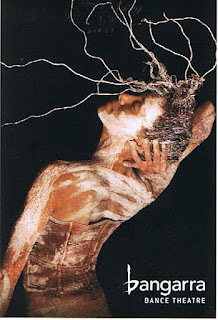David Page Talks- at Canberra Theatre Centre in the series Take Part: Artist Talk, August 25, 2012, 12:30pm
by Frank McKone
Bangarra Dance Theatre are touring their new work, Terrain – the timeless wonder and spiritual resonance of Lake Eyre to Canberra Theatre, September 13-15, with a pre-show forum at 6:30pm on the 13th.
Artistic
director Stephen Page commissioned Frances Rings to choreograph work
representing her mother’s country where Lake Eyre, Kati Thanda, has a
powerful story of a giant kangaroo being hunted and injured in the area
to the south around Maree, where Frances was brought up by her mother
and German father. The kangaroo escaped the hunters but died and turned
to salt where the lake is now.
Canberra Theatre Centre
are to be congratulated for establishing a new tradition, Take Part:
Artist Talk. In July, Scott Rankin talked about Ngapartji Ngapartji one,
Trevor Jamieson’s Anangu Pitjantjatjara Yankunytjatjara story. Today
Stephen Page’s elder brother, David, in keeping with his tradition, gave
a talk in the form of a story – of the formation and growth of Bangarra
and his role as composer.
When I went to a talk and
demonstration of dance given by Yolgnu man Wandjuk Marika and a young
nephew in Melbourne back in the late 1970s, it was difficult to believe
that Marika’s desire to bring his culture to the non-Indigenous world
would succeed. He explained then why his nephew was so nervous when
asked to dance stories when Marika had been given a hard time by other
elders who wanted to keep their culture inviolate. He was a brave young
man indeed. And, of course, how could people from the mainstream
commercial culture ever learn to appreciate Aboriginal culture, so
different from their own, especially concerning our relationship to the
land? But Marika was determined to try because, as he said that day,
Aboriginal culture will die unless it is taken out to the rest of the
world.
I thought of all this as David Page spoke, not
just of the tradition that it is the land that owns us, not we who own
and can buy and sell the land, but because the Marika family had been an
important part of Stephen Page’s learning traditional dance when he
first went from Sydney's National Aboriginal Islander Skills Development
Association (NAISDA) to Arnhem Land early in the 1980s.
In
Bangarra, Wandjuk Marika’s hope has been fulfilled. The Page family
boys, as David explained, came to fill the traditional roles, despite
their urban childhood in Mt Gravatt in Brisbane, of storyteller –
Stephen, the choreographer; dancer – Russell; and song man – David
himself, Bangarra’s resident composer. Founded in 1989 by Carole
Johnson, founding director of NAISDA, Bangarra has achieved what Marika
desired – keeping the integrity of their traditional culture while
creating connections between those stories, with the proper permissions
from the owners of those stories, with the feelings and ideas of people
beyond traditional boundaries through the mediums of dance and music.
To
see how what we like to call ‘modern dance’ and the styles that are
true to the ancient Australian heritage, can creatively become one, and
to do the same with musical expression, is to appreciate that the work
of Stephen and David Page is unique. And David even began to talk today
of retirement! Never, I hope – or at least there must be a new
Bangarra, a continuing ‘making of fire’, long into the future.
Frances
Rings, among others encouraged to take on this responsibility by
today’s elders, will surely continue to make Aboriginal – and everybody
else’s – culture live on.
© Frank McKone, Canberra

No comments:
Post a Comment